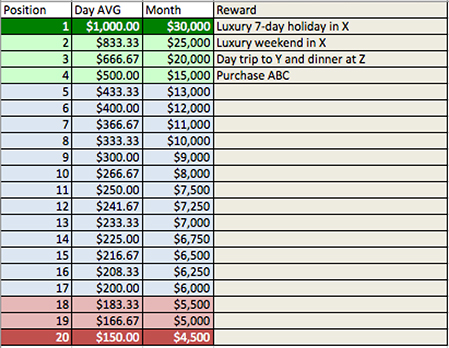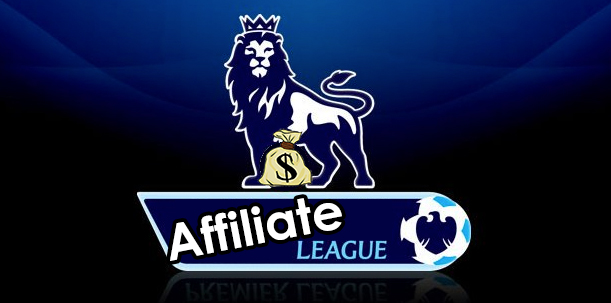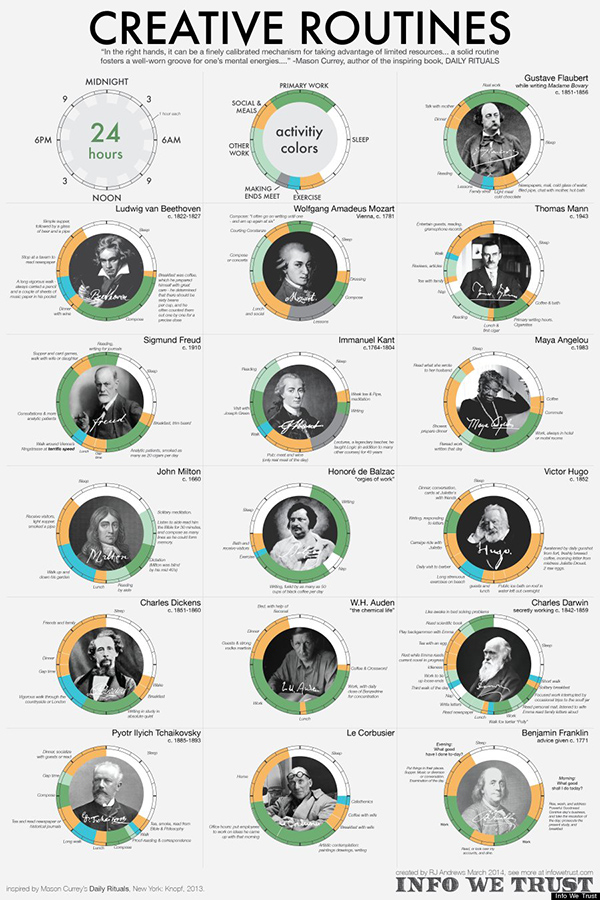How 1 Weird Table Keeps Me Motivated in the Morning
Affiliates have a daily scorecard.
“Profit per day.”
There are many ways you can track your progress in this industry.
The one method that doesn’t lie is profit taken.
The problem with measuring profit per day is that it exposes your morning ritual to one of two negative emotions:
Complacency and impatience.
A good day can breed complacency.
A bad day can breed impatience.
Either emotion can have a ruinous effect on your decision making.
And that’s why we should look beyond daily performance metrics if we want to stay motivated.
One of the methods I use involves gamification and an imaginary league table.
Hold on tight. This could get a little geeky.
‘League of Affiliates’
At the start of every month, I create an imaginary league table of twenty affiliates and how much they will have earned by the end of the month.
I set prizes for finishing at the top.
Here is how the table might look for an intermediate, mid-level affiliate:

Make sure that first place is attainable, and not so far detached from your current affiliate level that it triggers a nose bleed to look at.
In this example, $30,000 profit represents ‘the perfect month’.
What I like to do is tie 1st place to a big reward.
Something that I really, really want, or somewhere that I’d really like to go.
It could be a dream holiday; a big purchase; the proverbial jackpot that keeps you ticking.
If you have debts, it could be ‘Pay down Credit Card X‘ or ‘Wipe X% off the mortgage‘.
The idea being that if in 30 days time you have equalled or bettered the John Doe affiliate in 1st place, you get to treat yourself.
And not feel guilty about it.
I also create rewards for positions 2-4.
These positions should represent very good performance relative to what you would normally expect.
The rewards might range from a fancy week-long holiday in second place, to dinner at a top restaurant in fourth place.
For beginner affiliates, lower targets and smaller rewards will suffice.
(If you really want to be ironic, you can set a 5th place reward as a trip to the underbelly of Europe on Thursday night — and a Liverpool shirt. That’ll fucking teach you for getting complacent.)
In one of my own recent tables, I rewarded a ‘top four’ finish with the laser eye surgery I’ve been wanting for five years.
It was a real incentive to keep pushing myself for 30 days.
At the bottom end of the table is your absolute minimum income target. Set it in 17th place — just above the relegation zone.
No rewards for surviving relegation, or for doing a Stoke.
(‘Stoke’ is what I call my pub quiz team in Bangkok, btw. Or it was until last week — when we became QPR.)
If you succeed in getting yourself relegated, I’m not sure of the best action.
Perhaps a fist in the balls and a change of niche.
How does this improve my motivation?
Next to my table in Excel I have a running tally of my total profit in the current month. This is divided by the number of days in the month so far.
I take my average profit per day, times it by 30, and the table will tell me what position I’m in… and what rewards (if any) I have to look forward to.
Every day is another chance to improve my position in the table.
Sound fucking crazy yet?
Probably.
I hope so.
This form of gamification may seem obscene to some, but I get valuable motivation from it as a form of data/progress visualisation.
Without a running monthly tally, it’s tempting to ‘write off’ bad days, or reward yourself prematurely after one good day.
Most importantly, the table is directly tied to your goals.
I reset mine every month.
I set new rewards that I have to earn.
Visual representation of your performance is better than merely writing what you earned yesterday on a post-it note, soon to be buried by tomorrow’s avalanche of data.
It’s so easy to become obsessed with the last 24 hours… or the next 24 hours.
But a month is a loooooong time in affiliate marketing.
Use that knowledge to deflect any impatience or complacency that might be creeping in to your morning ritual.
+
Imaginary competition
+
Real-time ‘keeping score’
+
Rewards you actually want
=
A healthy fire under the arse.
What unusual ways do you have to stay motivated?
RECOMMENDED THIS WEEK:
- In case you missed it, my brand new 2015 edition of Premium Posts is available now. Need a recipe for affiliate success in 2015? You won’t find a single resource that covers as much ground as this. 375 pages of my very best tips and strategies.
- The Premium Posts 2015 Edition is sponsored by Adsimilis. You know all about Adsims, right? They are one of the best CPA networks in the business. If you run any kind of mobile, dating or sweepstakes… then sign up an affiliate account, ca-ching.
P.S. You can read 40 pages of Premium Posts 2015 for FREE by opting in to my monthly newsletter below:






I do actually, will post it when I get chance to remove my data/metrics from it!